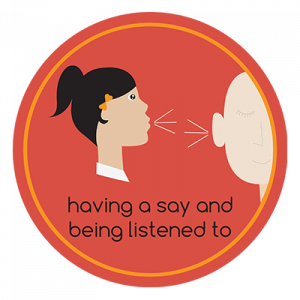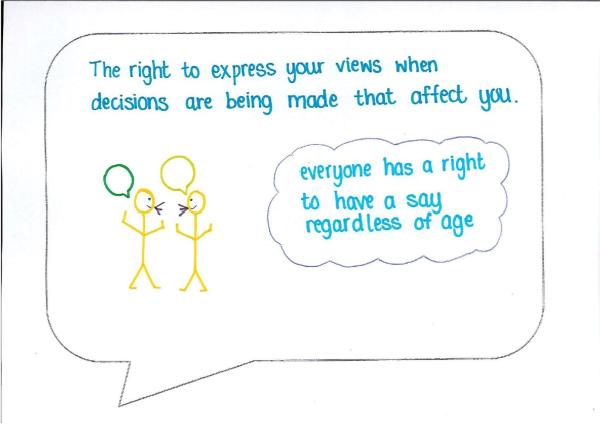You are here:
Having a say
What does this mean?

It’s your right to express your views and for your views to be taken into account when decisions are being made that affect you.
This right doesn’t mean adults need to always do what you say, but it does mean they should ask and consider your views as it is important.
In 2012, the people of Ireland voted to include children’s rights, including their right to be heard in some circumstances, in our constitution.
EXAMPLE: The Irish constitution now says that judges need to listen to the voice of the child in certain cases, like when parents are getting a divorce.

Learn more about this right
Do I have this right in Ireland?
- UNCRC, article 12 – it’s your right to have a say in matters that affect you and for adults to take it seriously.
- Under Article 42A in the Irish Constitution, it’s your right that courts need to hear and take account of a your views in family law and care cases.
- Under different articles in the Irish Constitution, it’s your right, if you’re an Irish citizen, to vote in elections when you are 18 years old
- Under the Education Act 1998, it’s your right to form a Student Ccouncil in secondary school and to receive support from your school in doing so.
- Under the Child Care Act 1991 and the Children’s First Act 2015, it’s your right that your wishes are taken into account when decisions are made about your care.
Doing a project?
- In 2015, the Government published a 5 year participation strategy to make sure children have a voice in decisions in their communities, in education, in healthcare, in the courts and in the legal system.
- Ireland is the only country in Europe to have a national strategy that is dedicated to children and young people’s participation in decision making.
- The Irish Secondary-Level Students Union gives support to student councils and is also a platform for students to express their views on issues about education.
- There are youth groups called Comhairle na nOg in 31 different local authorities all over Ireland. Being in these groups help you have your say in the community.
- The National Youth Council of Ireland has a campaign that to allow young people to vote at 16 years.
- The NCCA have a programme called Student Voice which encourages student participation and engagement in what they are learning and improves teacher-student relationships.
- In 2017, young people took part in a live-streamed event run by the ISPCC about internet safety. They said they wanted to feel better protected online and taught more digital skills in school.
- According to research published by the DCYA in 2015, children think their home is the place where they are most supported to have a voice in their daily lives.
- In 2016, the DCYA Young Voices report asked young people how they could feel included more in society.
- In 2014, the percentage of children aged 10-17 who participate in making the school rules increased by 3% over 4 years, from 32.6% to 35.5%.
Links to other organisations
- Dail na nÓg – Dail na nÓg is the national youth parliament of Ireland. There are also 34 Comhairle na nÓg around the country, you can find out more here.
- ISSU – The Irish Second-Level Students Union (ISSU) is the national umbrella body for school Student Councils
- GAA – Find out what the GAA is doing to hear the opinions of young people.
- Picture Your Rights – In 2015, children and young people worked with the Children’s Rights Alliance and Unicef to make a report for the UN Committee on the Rights of the Child about important issues for children in Ireland.
- Life as a young person in Ireland – In 2011, over 65,000 children and young people shared their views about living in Ireland with the Department of Children and Youth Affairs
- Voices of Youth – Voices of Youth is an advocacy group run by young people, for young people all over the world. They use the media to have a say about issues that concern them.
- Vote at 16– National Youth Council of Ireland have been campaigning for Government to extend the right to vote to 16 and 17 year olds for local, national and European elections.


